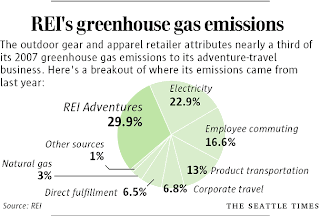
Here's my green-confession: I love traveling. Last year, I spent 9 months exploring Israel, during which I took a week-long seminar in Poland, and afterwards I hopped on over to France and Spain for 2 weeks before finally landing in the US - and unfortunately due to insufficient funds I've been stuck here since then. The big problem with my favorite hobby? It is oh so not sustainable: taking long flights adds a big chunk to this aspiring-to-be-climate-friendly adventurer's carbon footprint.
So, when the highlight of my e-mail update from the student travel website STA Travel was entitled, "Eco-Friendly Travel" I got pretty excited - after all, here are my two greatest passions wrapped up in one sustainable world exploring package! And then, of course, I got a grip on myself and thought... wait a minute, what exactly is this "ecotourism" and how green can it really be?

I'd heard about ecotourism before, but I'd never really thought too critically about it or even investigated what it's all about. (Considering that it encompasses my two favorite things, I have no idea why this was.) While it is pretty broadly defined, essentially, the whole idea behind it seems to be to travel in a low impact way while remaining conscious and taking responsibility for of your environmental footprint and the effects of your presence on the social welfare of the host country. According to the International Ecotourism Society, ecotourism is "responsible travel to natural areas that conserves the environment and improves the well-being of local people," (TIES, 1990). The guiding principles, according to TIES are:
"-minimize impact-build environmental and cultural awareness and respect-provide positive experiences for both visitors and hosts-provide direct financial benefits for conservation-provide financial benefits and empowerment for local people-raise sensitivity to host countries' political, environmental, and social climate."
This all sounds great, and I'd certainly rather hear that when people are traveling they are making an effort to be more conscious of their impact, but I had also heard that ecotourism has it's vices, so I wanted to investigate them too. Ironically even ecotourism has an environmental impact, simply by virtue of the fact that getting to these natural destinations involves planes, trains and automobiles.

A recent article by the Seattle Times cited the calculations for greenhouse gas emissions resulting from REI Adventures, an ecotravel program through REI (the outdoor gear and apparel retailer that is attempting to go carbon-neutral): nearly 1/3 of the company's emissions came from the travel program. So what's better? have people travel without a care for their surroundings, stop travelling completely, or travel ecofriendly and reconnect with the environment while seeing a different part of the world?
If we're on a carbon diet, instead of starving people of their everyday pleasures, why not offer a light option? Ecotourism is just another example of how green popular culture can be a happy medium, breaking people in to the movement without forcing it down their throats, and letting us have out carbon-guilty pleasures in a less harmful way.





0 Comments:
Post a Comment